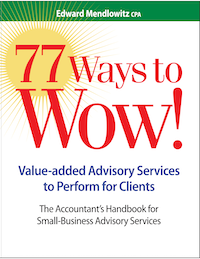 how good communication habits can head off problems.
how good communication habits can head off problems.
by ed mendlowitz
implementing fee increases
professional fees are typically billed based on time. yet, clients want outcomes and place a value on results, which doesn’t necessarily relate to time spent.
ingrained habits are hard to break away from. for ages, many professionals quoted jobs by providing hourly rates and possibly a range of expected hours. some projects are open-ended in the sense that no one knows where it will take them and what will be uncovered once work commences. this might include a forensic investigation, litigation where the discovery process becomes acrimonious, unraveling transactions in a complicated bankruptcy, a first-time audit of a multinational corporation or a tax audit for a reasonably sized business.
however, for most work, there is an understanding of what will need to be done and the approximate value to the client. this could include an annual audit, tax return, setting up a cost accounting or internal control system or a transfer price study. read more →


 question: i am sure you heard this before, but i just can’t seem to get on top of my work – i am always behind and in addition, my income has been dropping.
question: i am sure you heard this before, but i just can’t seem to get on top of my work – i am always behind and in addition, my income has been dropping. how good communication habits can head off problems.
how good communication habits can head off problems.




